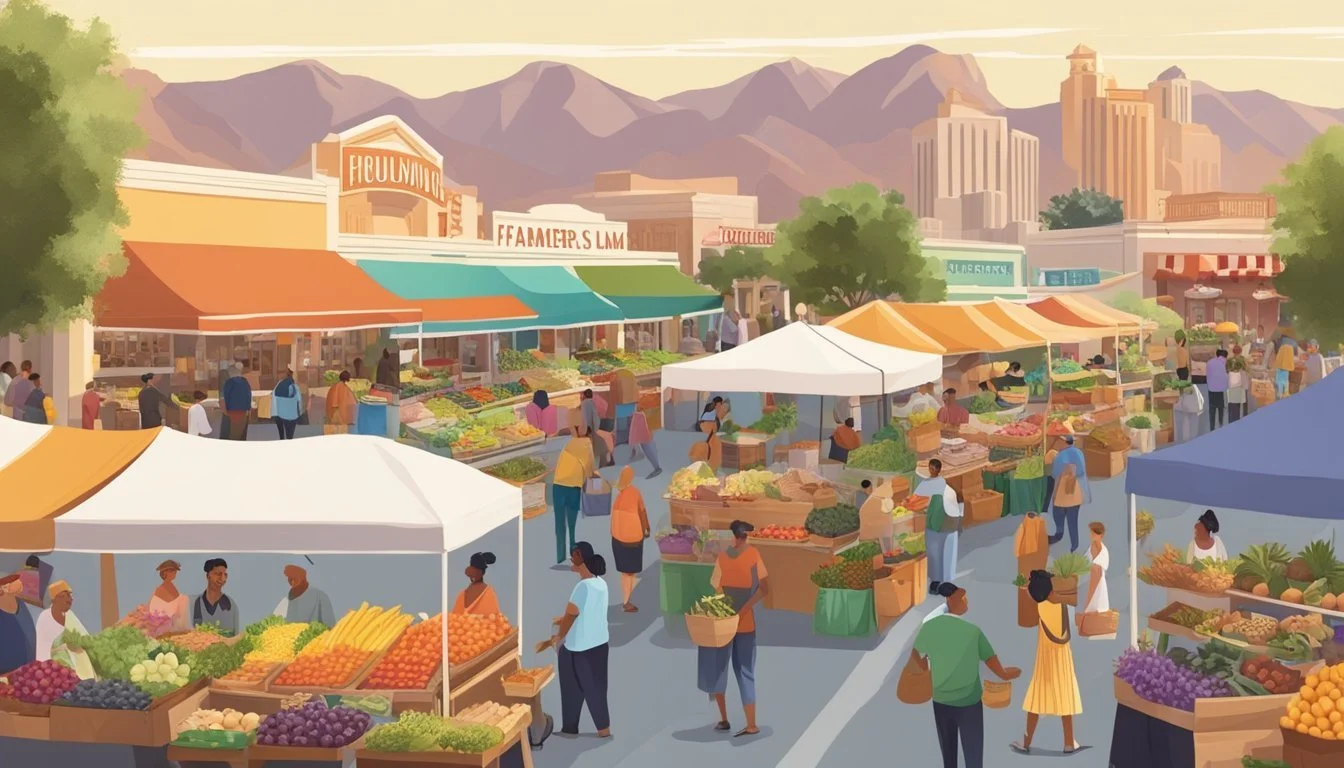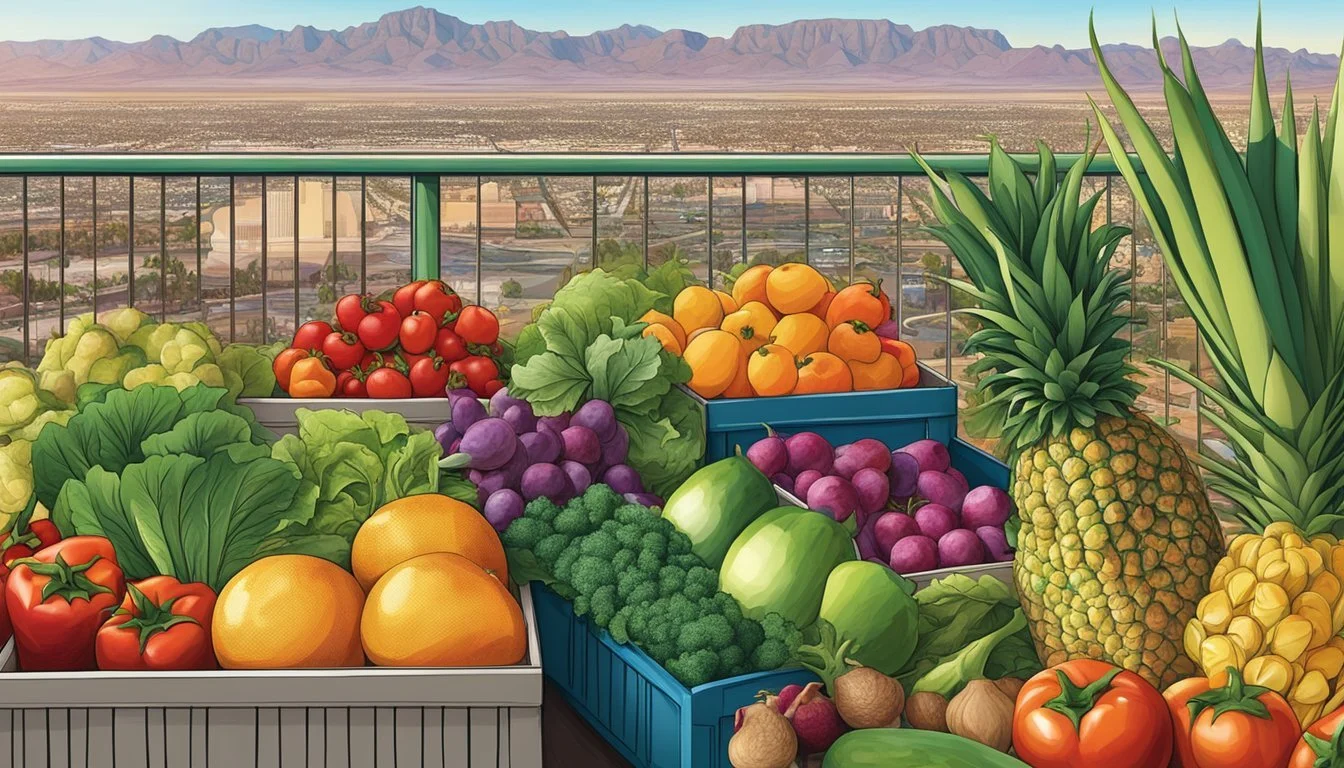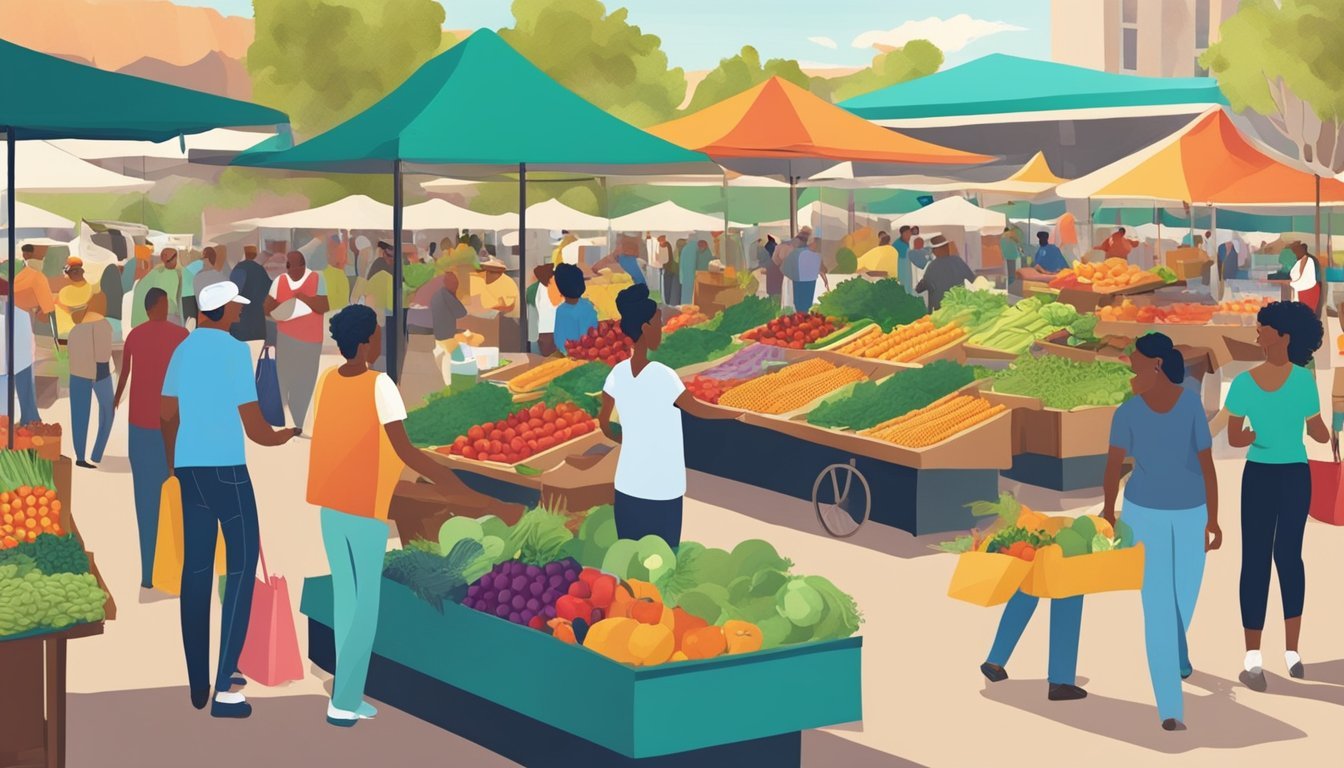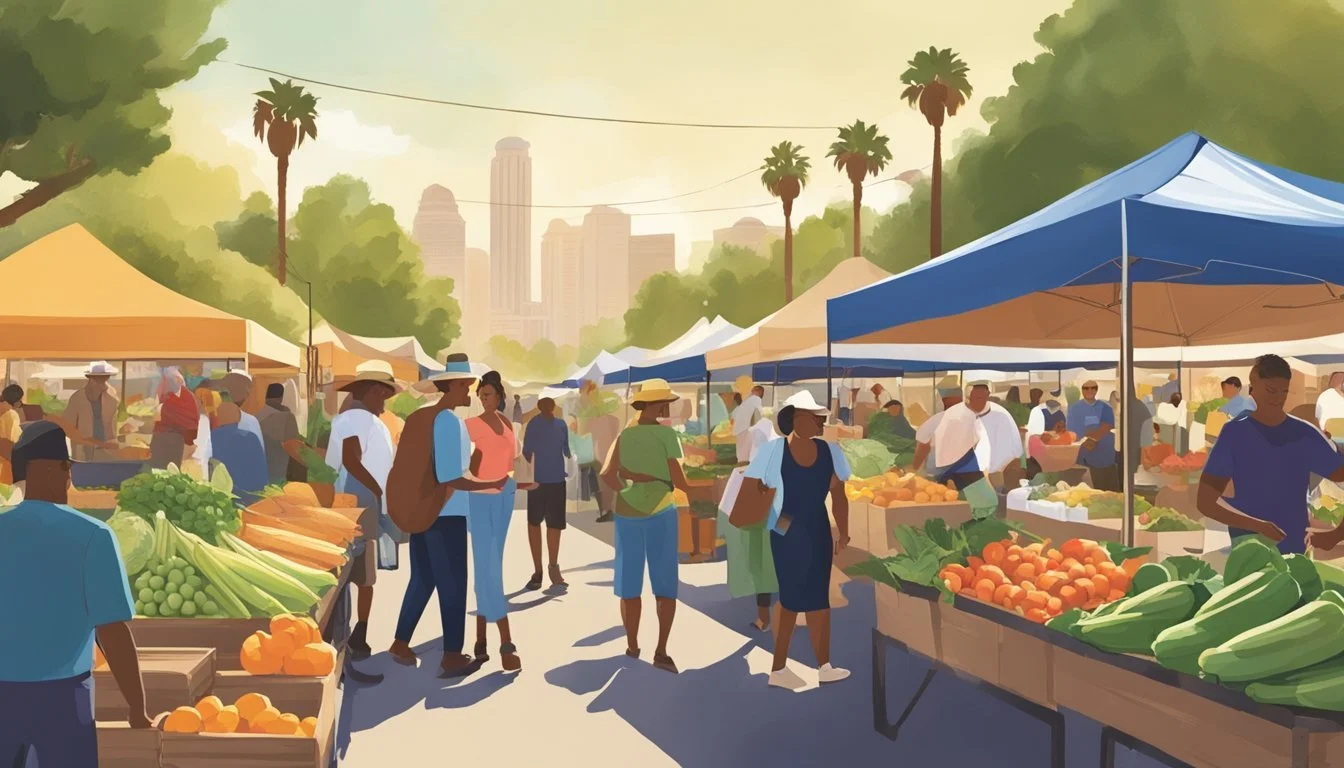Community Supported Agriculture (CSA) in Las Vegas, NV
A Guide to Local Farm Partnerships
Community Supported Agriculture (CSA) has gained traction in Las Vegas, Nevada, as residents seek fresh, locally-sourced produce and wish to support regional farmers. In a city renowned for its glitzy strip and desert landscape, the flourishing CSA movement is a testament to the community's embracing of sustainable and locally-focused food systems. Through CSA programs, consumers in Las Vegas are offered a share of the harvest from nearby farms, which not only bolsters the local economy but also fosters a connection between the growers and the community.
Individuals who join a CSA in Las Vegas pay in advance for a season’s worth of agricultural produce, which typically includes a variety of vegetables, fruits, and sometimes other farm products such as eggs or honey. This upfront investment gives local farms the financial security to plan their crop rotations and helps reduce waste by growing only the amount of food that is needed. The consumers receive regular deliveries or pick-up allocations of fresh foods, enjoying the seasonal bounty while sharing the risks and rewards of farming with the producers.
Several farms around Las Vegas, such as Cluck It Farm and Herbs by Diane, have established CSA programs that exemplify this symbiotic relationship between Las Vegas residents and local agriculture. With the rise of urban farms and community interest in sustainable food sources, the city has witnessed an expanding network of CSA options, offering diverse and accessible means for consumers to participate in the local food economy.
Understanding CSA
Community Supported Agriculture in Las Vegas, NV connects consumers directly with local farmers through a shared commitment to sustainable agriculture and the community.
CSA Fundamentals
Community Supported Agriculture (CSA) is a model where individuals purchase shares from a local farmer, entitling them to a portion of the harvest throughout the farming season. Shares are typically composed of a variety of fresh produce, picked at the peak of ripeness and flavor.
Typical share structure: A box of vegetables, fruits, and sometimes additional farm products.
Season duration: Can vary, with some starting as early as January in the Las Vegas area.
Benefits of Joining a CSA
The perks for CSA members go beyond just receiving fresh, locally-grown produce. There is a symbiotic relationship where members support the sustainability of local agriculture and farmers provide food with a reduced carbon footprint due to local distribution.
Freshness: Produce is harvested at optimal times for flavor and nutrition.
Support: Members help sustain small family-run businesses in their community.
Types of CSA Models
Different CSA models exist to accommodate the needs and preferences of both the consumers and the farmers. While the traditional model involves weekly pickups of farm produce, other variations have evolved.
Traditional CSA: Weekly pickups from a predetermined location.
Market-style CSA: Members choose from available produce at a designated market or farm stand.
Subscription CSA: Produce is delivered directly to members' homes or offices.
Each model is designed to foster closer relationships between consumers and their food sources, emphasizing seasonality, freshness, and community involvement.
CSA Memberships and Offerings
Community Supported Agriculture in Las Vegas provides a robust selection of farm-fresh produce and goods through seasonal memberships. Members enjoy a direct connection with local farms and receive a variety of offerings from vegetables to additional farm products.
Seasonal Produce Availability
Las Vegas CSA memberships offer a bounty of seasonal produce that includes a diverse range of vegetables and fruits grown in the area. Farmers tailor the contents of CSA boxes to reflect what is in harvest, ensuring a supply of fresh produce that corresponds with the seasons. For example, one may find crisp greens in the spring and hearty squashes in the fall.
Understanding CSA Shares
When someone purchases a CSA share, they are essentially investing in a local farm and, in return, receive regular distributions of produce. Shares commonly come in the form of weekly or bi-weekly boxes that provide a mix of the farm's current yield. Often, there is flexibility in the size of the share one can subscribe to, accommodating solo individuals or larger families.
Additional Offerings Beyond Produce
CSA shares often extend beyond just produce to include other farm products such as eggs, meat, and cheese. This encourages a more comprehensive approach to local and organic eating. Some farms may even offer handmade items, baked goods, or special event hosting for their members, deepening the community bond and supporting agricultural sustainability.
Selecting the Right CSA
Selecting the right Community Supported Agriculture (CSA) program in Las Vegas involves understanding farm practices and assessing the value compared to local farmers markets. It establishes a direct relationship between community members and local farms.
Evaluating CSA Farms
When choosing a CSA, one should evaluate the sustainability and farming methods of local farms. Consider if they offer a variety of produce and if items like honey or eggs are included. For instance, L.O.V.E. On Your Plate in Las Vegas focuses on organically grown produce and the well-being of their chickens.
Questions to Ask Potential CSA Farms
Before committing to a CSA, it's crucial to ask specific questions:
Production Methods: Is the produce grown organically?
Variety: What types of produce are included throughout the season?
Flexibility: Are there options for different sizes or types of shares?
Pick-up Points: Where and when can shares be collected?
Support Benefits: Does membership include any additional perks, such as reduced prices for events or farm visits?
Comparison to Farmers Markets
When comparing CSAs to farmers markets, consider:
Relationship: CSAs offer a closer tie to the farm, often providing detailed information about food sourcing.
Consistency: Unlike farmers markets, CSAs guarantee weekly produce, fostering regular support of the local farm.
Price: While farmers markets allow for purchase flexibility, CSAs can potentially offer a reduced price on the season’s harvest through shared risk.
By focusing on these aspects, individuals can make informed decisions that support both their needs and the local agricultural community.
Local Farms in Las Vegas
Las Vegas may be known for its bustling city life, but it's also home to a thriving local agriculture scene. The surrounding areas have a variety of farms that participate in Community Supported Agriculture (CSA) programs, offering fresh and organic produce to those in Southern Nevada.
Highlighted Las Vegas CSA Farms
Herbs by Diane
Located in Boulder City, NV, this farm provides a variety of herbs and participates in the CSA model, giving locals a taste of fresh, farm-to-table ingredients.
Cluck It Farm
As a family-run operation, Cluck It Farm offers CSA memberships that allow Las Vegas residents to receive fresh produce directly to their doors while supporting local agriculture.
Quail Hollow Farm
Another notable CSA, Quail (What wine goes well with quail?) Hollow Farm delivers a diverse range of organic produce, contributing to the region's agricultural diversity.
Diversity of Crops in Southern Nevada
Farms in the greater Las Vegas area, such as those situated in Moapa Valley, cultivate a wide range of crops due to the region's unique climate, including:
Fruit trees (with a focus on pomegranates)
Greenhouse-grown fruits and vegetables
Seasonal vegetables in hoop houses
This assortment ensures that CSA subscribers have access to diverse, nutritious produce throughout the year.
Organic and Sustainable Farming Practices
Local farms are deeply invested in organic and sustainable farming practices. They aim to provide not only healthful food options but also to maintain ecological balance and soil health.
Organic Focus: Farms like Quail Hollow prioritize organic methods to keep their produce free from synthetic pesticides and fertilizers.
Sustainability: Incorporating techniques like water conservation and composting, Southern Nevada farms emphasize the importance of sustainability in an arid climate.
By supporting these local farms through CSA programs, consumers are directly contributing to environmentally friendly farming efforts in Las Vegas and beyond.
Supporting Local Agriculture
Community-supported agriculture (CSA) in Las Vegas provides a direct bridge between local farmers and the community, enabling support for small-scale agriculture while ensuring fresh, local food is accessible.
Community Engagement with CSAs
By participating in CSAs, Las Vegas residents directly engage with local farmers, purchasing "shares" of produce that result in weekly deliveries or pickups of fresh fruits and vegetables. For example, Cluck It Farm offers a farm-fresh produce delivery service to its members, enhancing the connection between the consumer and the source of their food. This engagement promotes awareness and appreciation of the origin and quality of produce.
Impact of CSA on Local Economy
When a community supports its local farms through CSA subscriptions, it invests in the local economy. The funds from CSA memberships go directly to local farms such as Brighter Ideas Inc, allowing them to maintain operations, invest in sustainable practices, and provide jobs within the community. This system can act as a financial stabilizer for farmers who might otherwise be subject to the instability of crop yields and market prices.
Environmental Benefits
CSAs in Las Vegas also contribute to environmental sustainability. Farms that adopt community-supported models often follow organic or sustainable agriculture methods. For example, L.O.V.E. On Your Plate focuses on organically grown produce and raises happy chickens for their eggs. These practices lead to reduced pesticide use, improved soil health, and lower carbon footprints due to decreased food transportation distances. Consequently, CSAs contribute to a healthier environment as they support small farm operations adhering to sustainable practices.
Challenges and Considerations
Community Supported Agriculture (CSA) in Las Vegas, NV, faces specific challenges and considerations that are unique to the region's desert climate, the intricacies of managing a CSA program, and the economic commitment involved.
Weather and Growing Season Factors
Las Vegas Valley's arid climate presents distinct weather challenges for CSAs. Producers must contend with extreme temperatures that can negatively impact the growing season. The intense heat requires innovative solutions to expand the period during which crops can thrive. Efficient compost management and strategic crop selection adapted to the local conditions become essential tools to mitigate these climate challenges.
Logistical Challenges of CSA Membership
CSA membership entails a degree of coordination between farmers and members that can be logistically complex. In Las Vegas, distribution can be affected by the dispersed layout of the city. CSA organizers must ensure a reliable delivery system or central pickup locations that consider the varied schedules of their members. This could become particularly challenging during certain times of the year when the weather may impact transportation.
Financial Aspects of CSA Participation
Participation in a CSA requires a financial commitment that might be considerable for some members of the community. Members typically pay upfront for a season's worth of produce, which can strain personal budgets. However, this model also directly supports local farms, which can lead to more sustainable agricultural practices in the Las Vegas area. CSA members should assess the value of their investment considering the potential fluctuations in the amount and types of produce received weekly due to weather or growing season variations.
CSA Success Stories
Community Supported Agriculture (CSA) programs in Las Vegas, NV, have witnessed remarkable successes due to the robust relationships built between local farms and the community. These successes are evident in the enthusiastic testimonials from members and in the case studies of thriving local CSA endeavors.
Testimonials from CSA Members
CSA members in the Las Vegas area often express immense satisfaction with the quality and variety of produce they receive. One member praised Herbs by Diane, stating, "The weekly bounty of vegetables has revolutionized our family's eating habits." They underscore the value of the direct relationship with the farm, emphasizing the freshness and quality of the food on their table.
Another local, reflecting on their experience with Cluck It Farm, highlighted the convenience and joy of receiving farm-fresh produce directly to their door, saying, "Knowing we're supporting a family-run farm makes every bite taste even better."
Case Studies of Successful Local CSAs
Herbs by Diane, Boulder City, NV:
Success: Pioneered diverse vegetation adapted to the arid climate.
Community Impact: Enhanced the local food scene by providing fresh herbs and vegetables.
White Hills Ranchettes Greenhouse Farm:
Success: Established a strong CSA model that creates a direct connection between the farm and Las Vegas residents.
Community Impact: Brought together individuals committed to supporting sustainable agriculture.
Cluck It Farm, Las Vegas, NV:
Success: Implemented a door-to-door delivery system that began in January 2024, expanding reach to busy households.
Community Impact: Strengthened ties with the community by offering opportunities for members to directly engage with the farm through their CSA membership.
Future of CSA in Las Vegas
The Community Supported Agriculture (CSA) model in Las Vegas is poised for growth as demand for fresh, locally-sourced produce continues to rise. With innovations in urban farming, Las Vegas residents can expect more opportunities to participate in CSA programs.
Trends in CSA Participation
In Las Vegas, the uptake of CSA memberships shows no sign of waning. Consumers increasingly value transparency in their food sources and the assurance of high-quality, farm-fresh products. There's a growing recognition that these programs foster community resilience and provide vital support to local family-run businesses, enhancing the local food landscape. The trend suggests that CSAs will remain a significant component of Las Vegas's urban agriculture scene, helping to preserve farming traditions and support a sustainable food system within the desert city.
Innovations in Community Agriculture
Innovation is at the heart of Las Vegas's evolving CSA landscape. Urban Ag Tours and various agriculture-based educational programs highlight a community eager to engage with and advance local food systems. Innovations may include:
Vertical farming: Efficient use of space and resources to produce more with less
Hydroponics: Soilless farming practices improving yield in arid climates
Renewable energy integration: Incorporating solar power to reduce the carbon footprint of farms
Smart technology: Using data-driven insights for precision farming, optimizing water, and nutrient usage, which is vital for agriculture in a water-scarce region like Las Vegas.
Las Vegas's commitment to integrating these innovations with CSA models not only enriches the consumer experience but also ensures the city's farming future is adaptable and sustainable.







